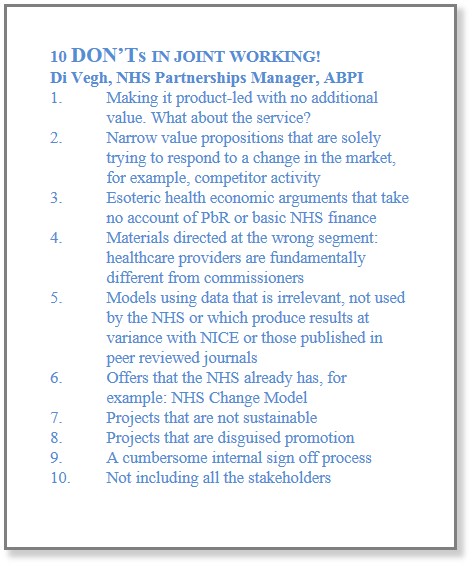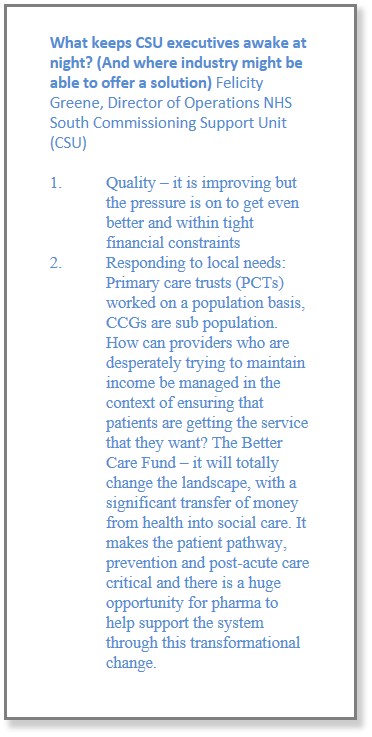Industry and the NHS - can promotion and partnership co-exist?

At the two-year anniversary of the most significant NHS reshuffle yet, Dr Beverly Barr, the Head of the PM Society Market Access Group, draws on her 20 plus years of experience spanning market access, marketing and consultancy to present what existing and emerging opportunities there could be for industry to work more closely with the NHS.
Two years on from the most significant NHS reshuffle yet, new research shows that the pharma industry has been swift to respond to opportunities within its relative comfort zone.1 However, the increasingly holistic approach to delivering health and social services may prove challenging unless companies adapt their approach away from product sales to mirror this.
Ninety-six companies responded to the recent survey:-
• More than half of the industry respondents (55.6%) now have a function or person dedicated to NHS Partnerships or joint working
• 53.8% are currently working on at least one partnership/ joint working project
• 91.5% have specific promotional activities aimed at payers, with 83% of these locally tailored
Further, it appears that NHS partnerships and joint working are firmly established as part of the commercial strategy, with 85% of industry and 56.8% of agency respondents stating this.
 "NHS partnerships and joint working are firmly established as part of the commercial strategy..."
"NHS partnerships and joint working are firmly established as part of the commercial strategy..."
Is partnership and joint-working the way forward?
There is undoubtedly a place for NHS partnership and joint-working says Di Vegh, NHS Partnership Manager, ABPI speaking at a recent meeting to debate the role of promotion and partnership in working with the NHS: "The key to a successful joint working project is that an equal contribution is made by NHS and industry - it doesn't have to be money, it could be a resource. It is also important to ensure that the appropriate corporate structures are in place, including a policy and clear processes for internal approval and certification."
Vegh went on to explain that most of the 30 or so joint working projects that her team is working on have come via Academic Health and Science Networks. Focus points include the Formularies Good Practice Guide, NICE Implementation, medicines optimisation and knowledge exchange.
New frontiers
The most critical new opportunity is the growing emphasis on social and holistic care. Yet only a quarter of the industry respondents in the recent survey have or are preparing a strategy to address this. Among the plethora of new organisations, Commissioning Support Units (CSUs) provide infrastructure support that Commissioning Care Groups (CCGs) cannot fund individually in the way that larger Primary Care Trusts (PCTs) did previously. Their remit includes HR, payroll, finance and contracting. The other key area for CSUs is communications and public/ patient involvement and involving certain population groups can be challenging. Some CSUs are also playing a clinical support role in independent funding requests (IFRs), medicines optimisation and continuing healthcare. It is in the continuing healthcare that the boundaries between health and social care are really beginning to blur.
Among the plethora of new organisations, Commissioning Support Units (CSUs) provide infrastructure support that Commissioning Care Groups (CCGs) cannot fund individually in the way that larger Primary Care Trusts (PCTs) did previously. Their remit includes HR, payroll, finance and contracting. The other key area for CSUs is communications and public/ patient involvement and involving certain population groups can be challenging. Some CSUs are also playing a clinical support role in independent funding requests (IFRs), medicines optimisation and continuing healthcare. It is in the continuing healthcare that the boundaries between health and social care are really beginning to blur.
Transformational change
"Transformational change underpins most of what the NHS is aiming to achieve. Preventing patients from becoming acute and getting them home with appropriate support sooner presents a great opportunity for industry, which can support the transition," commented Felicity Greene, Director of Operations NHS South Commissioning Support Unit, who was on the panel alongside Di Vegh. Greene cited the Isle of Wight as the first region in the UK to have one board that manages acute, community and ambulance services so that they can be flexible.
"Industry should ignore at its peril the local authorities who are coterminous to the CCG and acute trusts," Felicity concluded. "Health and wellbeing boards are growing in in power and the Better Care Fund is a good starting point for understanding this better."
"Marketing cannot be useful without market access, and the two disciplines are in my opinion increasingly convergent"
"Importantly, industry needs to work to ensure that it plays an appropriate role. An NHS manager cutting staff will be demonised in the local press. Cut the drug budget and they are a hero. Pharma needs to be seen as part of the financial solution rather than a problem, despite the relatively low proportion of spend on medicines – it's an easy target," Greene explained. "The big management consultancies are all already in on pathway design and pharma also has the intellectual firepower to help with this. There are opportunities to make use of industry's global experience in this – by helping UK NHS executives to learn from their peers in other countries," She concluded.
Transparency and value creation
"Marketing cannot be useful without market access, and the two disciplines are in my opinion increasingly convergent.'', said Jonathan Dancer, Managing Director of Redbow Consulting.
It is clear that promotion and partnership can co-exist and that industry can work with health and social care providers as long as there are mutual and transparent benefits. For health and social care providers these may include:-
• Improved concordance
• Patient education and lifestyle applications
• Support for treatment initiation
• Outcomes measurement
• Service design
• Medical education
However first there is a need to overcome potential barriers to partnership working. Misperceptions, stereotyping or one bad experience can destroy trust or perhaps practical issues get in the way. The key is to align the relationship with the needs of the customer. Relationships can never be purely one-way.
''Value must be the watchword. It doesn't exist until it is perceived by the customer and the customer must experience the 'product' to perceive value. Adoption involves establishing relevance to their own life/ role," explained Dancer.
The challenge we face is that value is a subjective measurement - value truly is in the eye of the beholder. Think of the infinite value of a toddler's work of art to its loving mother – which no one else would pay a penny for. Whilst works by sought after artists like Franz Kline may be worth millions to a connoisseur of modern art. Trust, partnership, promotion and relationship all centre around creation and the exchange of value, with value the universal currency that can enable promotion and partnership to co-exist
"The challenge we face is that value is a subjective measurement - value truly is in the eye of the beholder."
Responsibility and opportunity for industry
If we want to ensure that promotion and partnership can co-exist, it is incumbent on industry to make sure that they build trust with the NHS. In order to do this they need to align themselves with the NHS and their local priorities. Only then will they be able to establish what is of 'mutual value'. There is no doubt that the road to gaining this level of trust will be rocky, but it is vital that industry considers the local needs of the NHS and that in any proposed working project or partnership they are honest and open about what is in it for them. The industry has a huge role to play in establishing a working relationship that allows the NHS to provide the best and most cost effective medicines and services, but with this new responsibility comes new opportunities for us all to improve patient care in the long term."
Reference
1. PM Society research http://www.pmsociety.org.uk/article/industry-and-the-nhs-promotion-and-partnership
About the author:
Dr Beverly Barr, Head of Market Access and Vice-Chair of the PM Society, has worked for over 20 years providing market access, communications and consultancy solutions in the international healthcare arena.
Have your say: How can we overcome barriers in partnership working?











